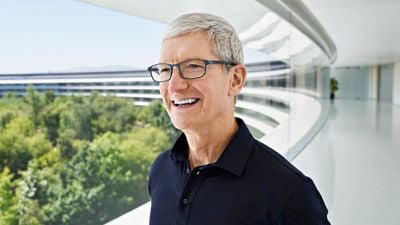Apple CEO Tim Cook talked about product innovation and how it drives Apple to make better products in an interview with Popular Mechanics.

During the interview published in a special edition of Popular Mechanics, Cook describes Apple's philosophy of creating innovative new products and how Apple has fostered an environment of innovation.
They don't take any singular route, they can come from everywhere in the company. We believe in putting groups of people together focused on solving some problem for a user. You pick diverse teams that look at the problem through different lenses.
We debate about things that we do and do not do, because we know we can only do a few things well. You have to debate and say no to a lot of great ideas so that you can spend your time on the ones that are truly unbelievable.
Answering whether there was ever a time Cook first heard an idea and said, "that's cool," he recalls talking to staff about the M1 and M2 Apple silicon chips and Apple's rich history of creating chips for its products.
Oh, they happen all the time. I feel like that every day—like a kid in a candy store. We were just talking in the hallway about M2 and M1—the history there goes back well over a decade. It goes back to the genesis of the M chips, or the A chips, from iPhone and really getting in and figuring out, how do you put a powerful chip in something that small and not get it to heat up and burn up?
We found ourselves with a similar issue for laptops: How do you put something in there that is the most powerful computer chip in the world? Out of that was born M1, and now we've taken it further with M2. And Mac is now a totally different product than it was before.
Cook also described Apple as an environment where people don't take no as an answer, saying that claiming something is impossible is a driving force of motivation for Apple engineers.
Well, usually the way that you get people around here to do something is to tell them you're not sure it's doable. That's the red flag in front of the bull because a lot of people here don't take "impossible" as being true. If we convince ourselves it's in the best interest of the user, that's a compelling force for us to power through the problem.
Cook said that privacy is a fundamental human right and that the company's work in empowering users with privacy focused features is a core philosophy.
Touching on Apple's role internationally, Cook said that Apple has a set of core values that's the company's north star, including privacy, education, accessibility, and the environment. Cook also, for the first time publicly, commented on Apple's new self-service repair program, which recently launched for the Mac. The program lets customers order the parts needed to repair their own iPhone or Mac, such as a battery or display replacement. Cook said the program is intended for customers who are technologically capable of handling repairs on their own.
There's actually something in there for everybody. We took a larger view and said, "What do people want?" First of all, they want products that don't break. So we try really hard to make products that last a long time, and that's sort of job one.
But invariably, some people do have to go somewhere for a repair. And you don't want to have to drive two hours to find a repair center. So we've added thousands of independent repair shops.
In addition to that, for the hobbyist and the tinkerer, we said, "We'll sell you certified parts" - parts that we use to repair. You can buy the part itself instead of buying a repair. And if you need a manual that tells you how to do something, you can have the manual. And if some special tools are required or fixtures required, we can give you that, too. I don't know how many people will take us up on it. It's for your reader, clearly.
Towards the end of the interview, Cook was asked what he thinks Steve Jobs would think about Apple today. He responded by saying he thinks Jobs would love some of the things, but admits for other things he might say Apple could do better.
I think about him a lot. I miss him dearly. He would always stop by my office on his way out. And there's never been a replacement for that. We would exchange tidbits on the day and talk about the future. And we try to carry on the mission that he set in place, to build the best products in the world that enrich people's lives. And that hasn't changed. Lots of things change with time. But the reason for our being is the same.
I think he would find things that he loved and things that he would say, "We can do better on that." I think he would do both. As we all do. We are never really satisfied. We're always working on tomorrow.
You can find the full interview here.